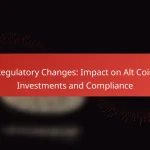Regulatory risks in alt coins encompass the challenges of navigating compliance with existing laws, the potential for enforcement actions, and their subsequent impact on market stability. As regulatory frameworks evolve, they play a crucial role in shaping the classification, trading, and utilization of alt coins, directly influencing investor confidence and market dynamics. Understanding these risks is essential for participants in the alt coin space to safeguard their investments and adapt to changing regulations.
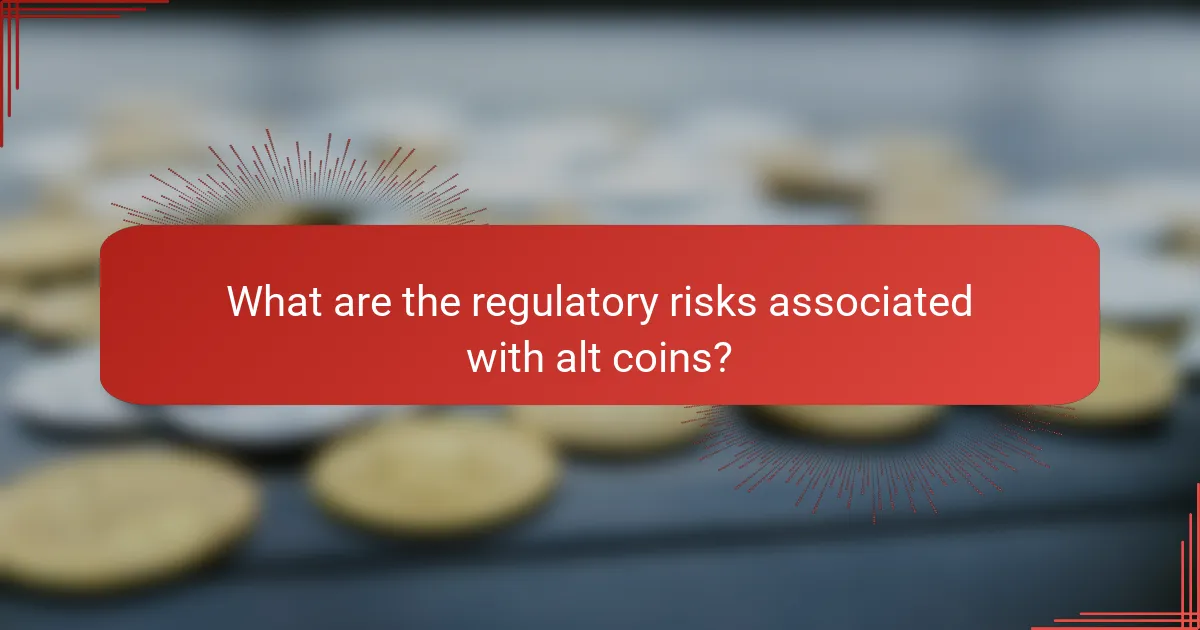
What are the regulatory risks associated with alt coins?
Regulatory risks for alt coins involve uncertainties regarding compliance with existing laws, potential enforcement actions, and the impact on market stability. These risks can lead to significant financial losses and affect investor confidence, making it crucial for participants to understand the landscape.
Market volatility
Alt coins are often subject to high market volatility, which can be exacerbated by regulatory news or changes. For instance, announcements of potential regulations can lead to rapid price fluctuations, impacting investor sentiment and trading volumes. This volatility can create opportunities but also significant risks for traders and long-term holders alike.
Investors should monitor regulatory developments closely, as sudden shifts can lead to price drops of tens of percent within short timeframes. Establishing stop-loss orders and diversifying portfolios can help mitigate these risks.
Compliance challenges
Compliance with regulations is a major challenge for alt coin projects, as the legal landscape is constantly evolving. Different countries have varying requirements, which can include registration, reporting, and anti-money laundering (AML) measures. Navigating these complexities can be daunting for new projects without legal expertise.
To address compliance challenges, projects should consider consulting with legal professionals who specialize in cryptocurrency regulations. Regular audits and transparent communication with regulators can also enhance compliance efforts and build trust with investors.
Legal repercussions
Failure to comply with regulatory standards can lead to severe legal repercussions, including fines, sanctions, or even criminal charges. For example, the U.S. Securities and Exchange Commission (SEC) has taken action against several alt coin projects for operating without proper registration. Such actions can tarnish reputations and lead to financial losses.
To avoid legal issues, it is essential for alt coin projects to conduct thorough legal assessments before launching. Keeping abreast of regulatory changes and adapting business practices accordingly can help mitigate the risk of enforcement actions.
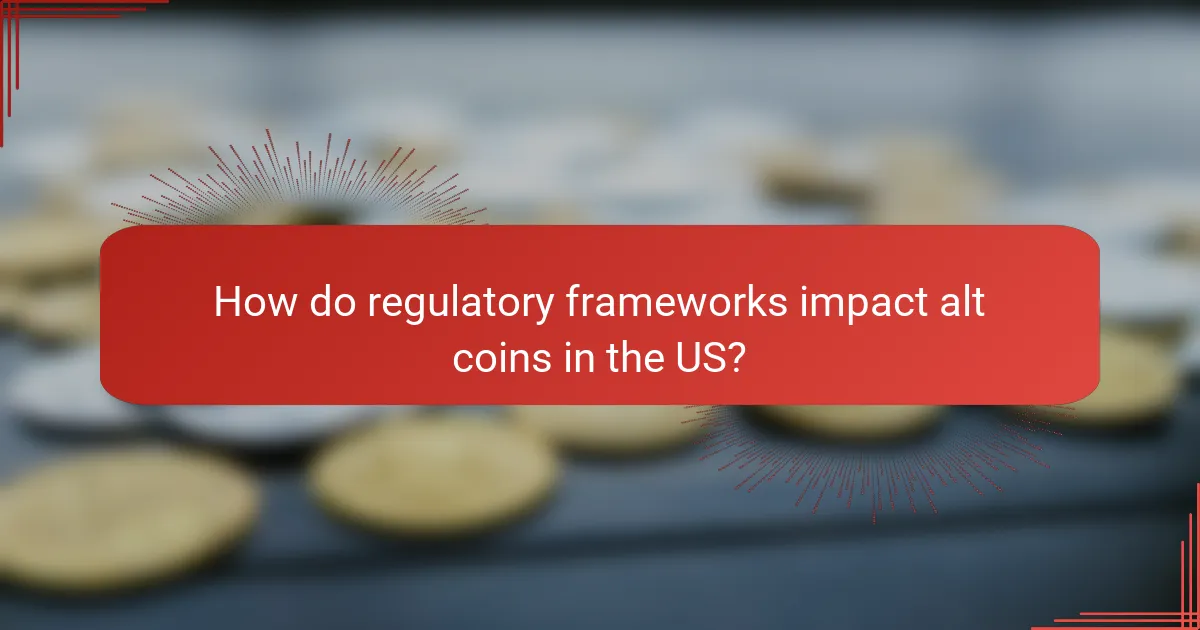
How do regulatory frameworks impact alt coins in the US?
Regulatory frameworks significantly influence alt coins in the US by establishing compliance requirements and enforcement actions that can affect market dynamics. These regulations shape how alt coins are classified, traded, and utilized, impacting both investors and developers.
SEC regulations
The U.S. Securities and Exchange Commission (SEC) regulates alt coins by determining whether they qualify as securities. If classified as securities, alt coins must adhere to strict registration and reporting requirements, which can limit their market accessibility and increase operational costs.
For example, many initial coin offerings (ICOs) have faced scrutiny under SEC regulations, leading to enforcement actions against projects that failed to register properly. This regulatory oversight can deter innovation but also aims to protect investors from fraudulent schemes.
State-level compliance
In addition to federal regulations, alt coins must navigate various state-level compliance requirements, which can vary significantly across jurisdictions. Some states have implemented their own licensing frameworks for cryptocurrency businesses, adding another layer of complexity for alt coin projects.
For instance, New York’s BitLicense requires companies dealing with digital currencies to meet specific operational standards, while other states may have more lenient or no regulations at all. This patchwork of state regulations can create challenges for alt coin developers seeking to operate nationwide.
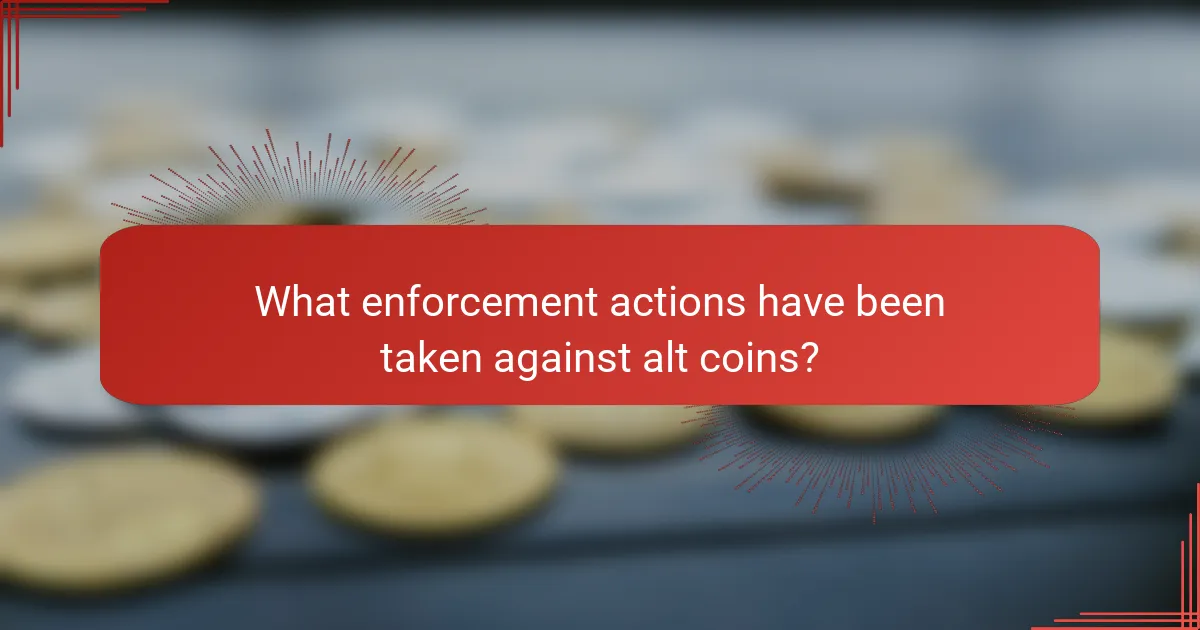
What enforcement actions have been taken against alt coins?
Enforcement actions against alt coins have increased significantly as regulators seek to address compliance issues and protect investors. These actions often involve investigations, fines, or legal proceedings aimed at ensuring that alt coin projects adhere to existing financial regulations.
Notable SEC cases
The U.S. Securities and Exchange Commission (SEC) has taken several high-profile enforcement actions against alt coins, particularly those deemed to be unregistered securities. For instance, cases involving projects like Ripple (XRP) and Telegram’s TON have highlighted the SEC’s stance on token offerings and their compliance with securities laws.
In these cases, the SEC typically argues that the tokens were sold as investment contracts, thus requiring registration. This has led to significant financial penalties and ongoing litigation, which can impact the market perception and viability of the affected alt coins.
International enforcement examples
Globally, various jurisdictions have enacted enforcement actions against alt coins, reflecting a growing trend in regulatory scrutiny. For example, in the European Union, authorities have begun to implement stricter regulations under the Markets in Crypto-Assets (MiCA) framework, which aims to provide a comprehensive regulatory environment for crypto assets.
In Asia, countries like China have taken a hardline approach, banning Initial Coin Offerings (ICOs) and shutting down exchanges. These international actions can create a ripple effect, influencing market dynamics and investor confidence in alt coins across different regions.
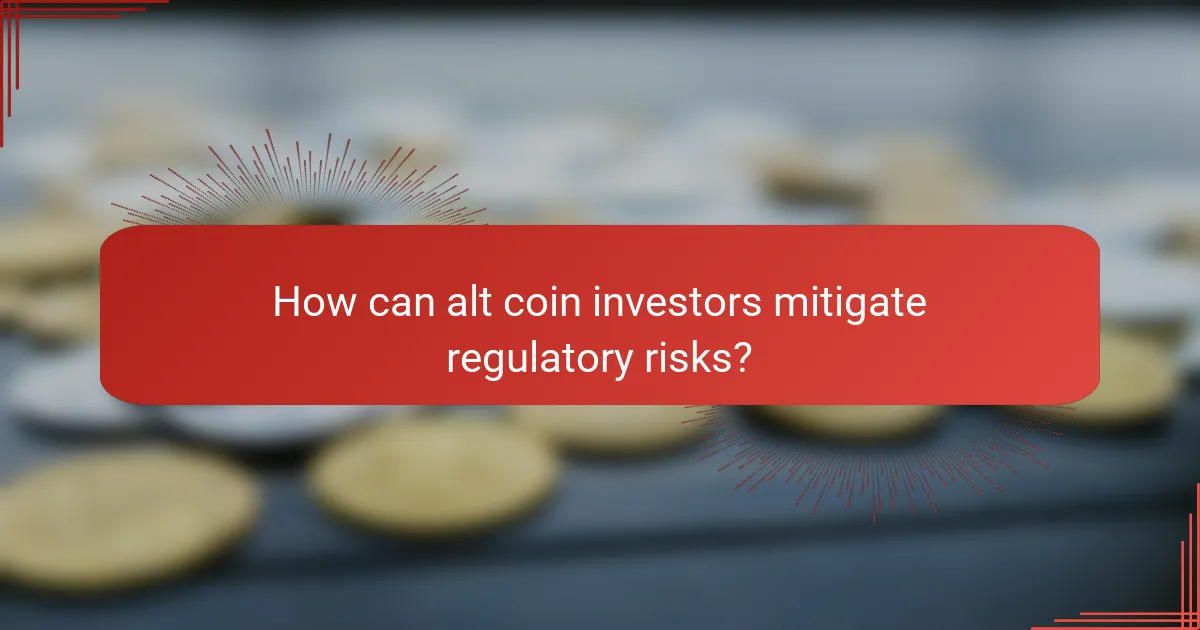
How can alt coin investors mitigate regulatory risks?
Alt coin investors can mitigate regulatory risks by staying informed about compliance requirements and utilizing effective tools and practices. This proactive approach helps in navigating the evolving landscape of cryptocurrency regulations.
Due diligence practices
Conducting thorough due diligence is essential for alt coin investors to identify potential regulatory risks. This includes researching the legal status of the alt coins, understanding the issuing entities, and reviewing their compliance history. Investors should also assess the regulatory environment in their jurisdiction, as laws can vary significantly across countries.
Investors can create a checklist to evaluate alt coins, focusing on factors such as the project’s whitepaper, team credentials, and any existing legal challenges. Engaging with community forums and expert analyses can provide additional insights into the regulatory landscape surrounding specific alt coins.
Regulatory compliance tools
Utilizing regulatory compliance tools can help investors manage risks associated with alt coins. These tools often include software that tracks regulatory changes, monitors transactions, and ensures adherence to local laws. Some platforms offer features like automated reporting and risk assessments tailored to specific jurisdictions.
Investors should consider tools that provide real-time updates on regulatory developments, as this can help them make informed decisions. Additionally, collaborating with legal advisors or compliance specialists can further enhance an investor’s ability to navigate complex regulations effectively.
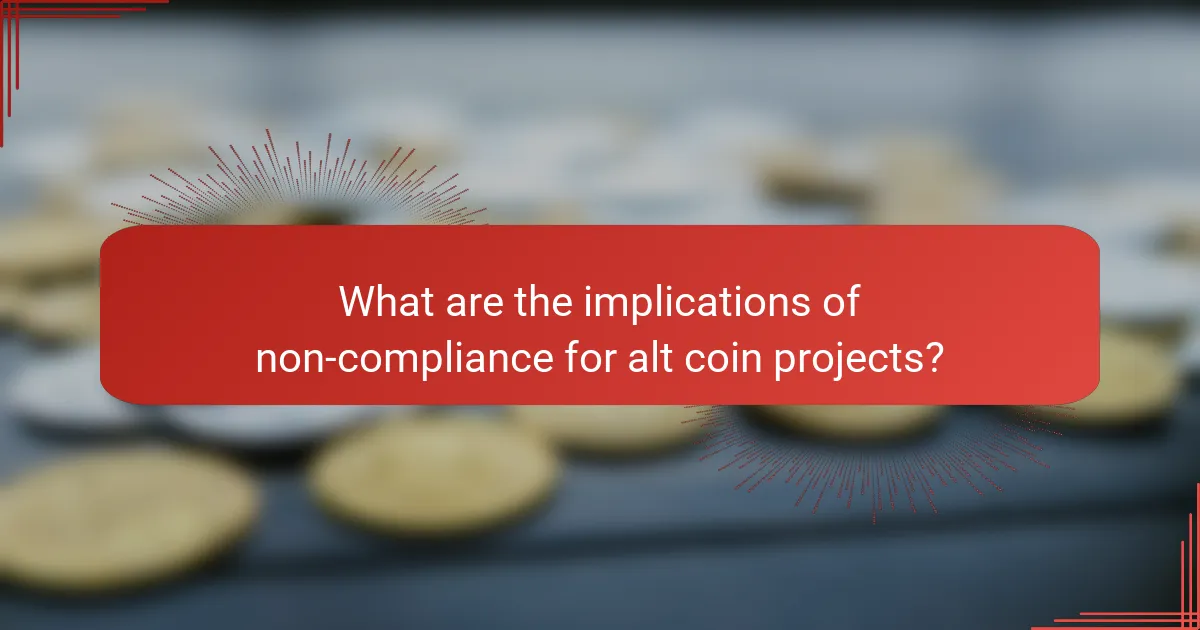
What are the implications of non-compliance for alt coin projects?
Non-compliance for alt coin projects can lead to severe consequences, including financial penalties and potential project shutdowns. These implications can significantly impact the viability and reputation of the project in the competitive cryptocurrency market.
Financial penalties
Financial penalties for non-compliance can vary widely depending on the jurisdiction and the severity of the violation. In some cases, penalties can reach into the millions of dollars, especially if the project is found to have violated securities laws or anti-money laundering regulations.
For example, a project operating in the United States may face fines from regulatory bodies like the SEC or FinCEN. It’s crucial for alt coin projects to conduct thorough compliance audits to identify potential risks and mitigate them before they incur penalties.
Project shutdowns
In extreme cases, non-compliance can lead to the complete shutdown of an alt coin project. Regulatory authorities may issue cease-and-desist orders, effectively halting all operations until compliance is achieved. This can result in significant financial losses and damage to the project’s reputation.
Projects that fail to adhere to local regulations may also find it challenging to regain trust from investors and users. To avoid shutdowns, alt coin projects should stay informed about regulatory changes and proactively engage with legal experts to ensure compliance.
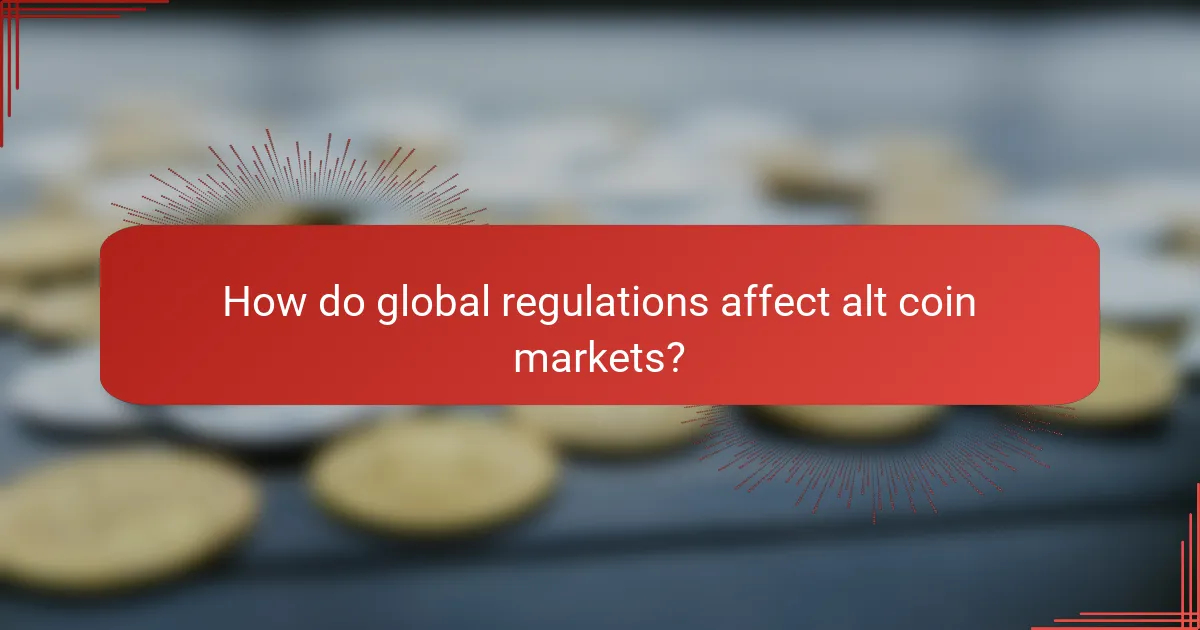
How do global regulations affect alt coin markets?
Global regulations significantly impact alt coin markets by shaping compliance requirements, influencing investor confidence, and determining market accessibility. Different jurisdictions have varying approaches to regulation, which can either facilitate or hinder the growth of alt coins in those regions.
Comparative analysis of jurisdictions
Regulatory environments for alt coins vary widely across countries. For instance, the United States has a complex framework involving multiple agencies like the SEC and CFTC, while countries like Switzerland have adopted a more favorable stance, promoting innovation through clear guidelines. This disparity can affect where companies choose to launch their alt coins.
In Asia, nations like Singapore and Japan have established progressive regulatory frameworks that encourage alt coin development, contrasting with countries like China, which has imposed strict bans on cryptocurrency activities. Understanding these differences is crucial for businesses looking to navigate the global alt coin landscape.
Impact on market entry strategies
Regulatory compliance directly influences market entry strategies for alt coin projects. Companies must assess the regulatory landscape of their target markets to determine the feasibility of launching their products. For example, a project aiming to enter the European market must comply with the EU’s MiCA regulations, which can involve extensive legal consultations and adjustments to their business model.
Additionally, firms should consider the potential for regulatory changes that could impact their operations. Engaging with local legal experts and staying informed about upcoming regulations can help mitigate risks. A proactive approach may include developing flexible business strategies that can adapt to evolving regulatory requirements.


